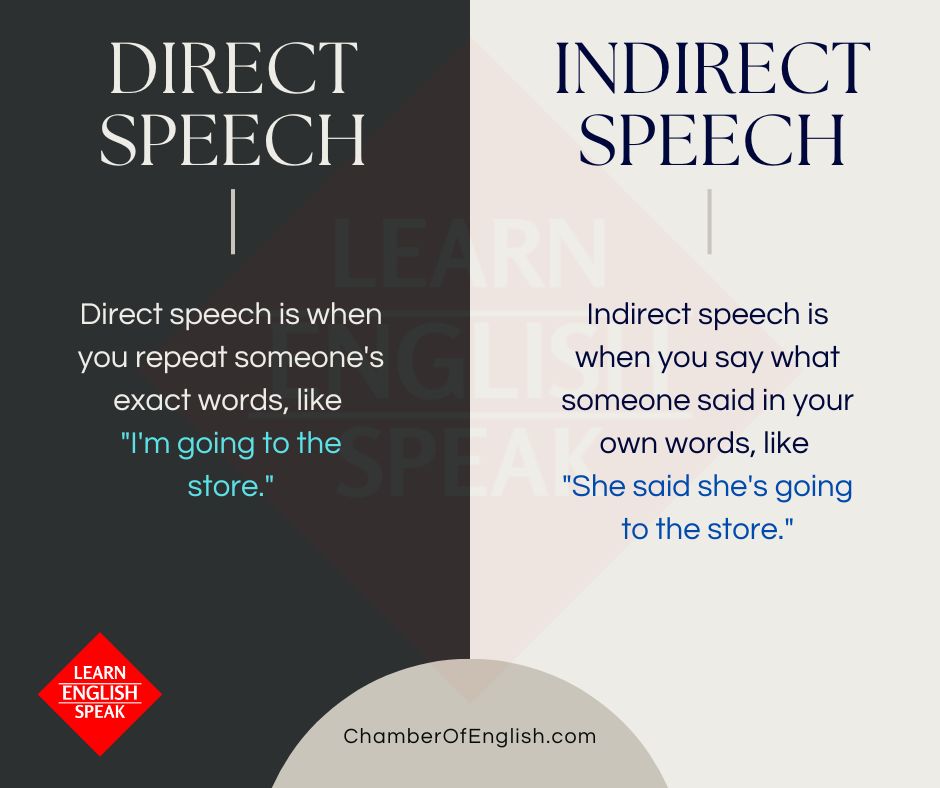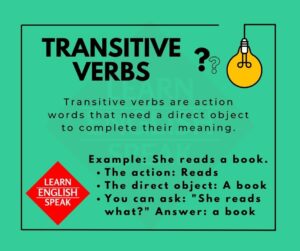Direct speech is when you repeat someone’s exact words, like “I’m going to the store.”
Indirect speech is when you say what someone said in your own words, like “She said she’s going to the store.”
So, direct speech uses the exact words, while indirect speech rephrases what was said. Remember, in indirect speech, things like tenses, pronouns, and time expressions might change to fit the new sentence.
A. Changes in Tenses and Passive Voice in Reported Speech
Reported speech, also known as indirect speech, requires us to convey the words spoken by someone else while adapting them to a new context. This often involves changes in tenses and passive voice to accurately represent the original message. Let’s explore how different tenses and passive voice transform in reported speech, along with examples for each:
- Simple Present Tense:
- Direct Speech: “I eat an apple.”
- Reported Speech: He said that he ate an apple.
- Present Continuous Tense:
- Direct Speech: “She is reading a book.”
- Reported Speech: She said that she was reading a book.
- Simple Past Tense:
- Direct Speech: “They visited the museum.”
- Reported Speech: They said that they visited the museum.
- Past Continuous Tense:
- Direct Speech: “I was playing tennis.”
- Reported Speech: He said that he had been playing tennis.
- Simple Past Perfect Tense:
- Direct Speech: “She had finished her work.”
- Reported Speech: She said that she had finished her work.
- Past Perfect Continuous Tense:
- Direct Speech: “They had been studying for hours.”
- Reported Speech: They said that they had been studying for hours.
- Present Perfect Tense:
- Direct Speech: “I have seen that movie.”
- Reported Speech: She said that she had seen that movie.
- Present Perfect Continuous Tense:
- Direct Speech: “He has been working all day.”
- Reported Speech: He said that he had been working all day.
- Future Simple Tense:
- Direct Speech: “I will come tomorrow.”
- Reported Speech: She said that she would come the next day.
- Future Perfect Tense:
- Direct Speech: “They will have finished by then.”
- Reported Speech: They said that they would have finished by then.
- Present Passive Voice:
- Direct Speech: “The book is read by her.”
- Reported Speech: She said that the book was read by her.
- Present Passive Continuous Voice:
- Direct Speech: “The cake is being baked.”
- Reported Speech: They said that the cake was being baked.
Remember that when transforming tenses and passive voice in reported speech, the changes depend on the context and the tense of the original statement. Adapting these changes correctly ensures that the essence of the original message is conveyed accurately in the reported speech.
B. Changes in Pronouns in Reported Speech
Reported speech, also known as indirect speech, involves relaying someone else’s words while adapting them to a new context. Pronouns play a crucial role in this transformation, as they need adjustments to match the perspective of the reporting speaker. Here’s a brief overview of how pronouns change in reported speech:
Changing Pronouns:
Pronouns in reported speech often change to reflect the perspective of the reporting speaker or the listener.
- Direct Speech: “I am reading a book.”
- Reported Speech: She said that she is reading a book.
First Person to Third Person:
Pronouns shift from the first person to the third person in reported speech.
- Direct Speech: “I will come tomorrow.”
- Reported Speech: He said that he would come the next day.
Second Person to Third Person:
Pronouns shift from the second person to the third person in reported speech.
- Direct Speech: “You should call your parents.”
- Reported Speech: He said that I should call my parents.
Third Person to Third Person:
When the original and reported speeches are both in the third person, there’s often no change in pronouns.
- Direct Speech: “She mentioned visiting the museum.”
- Reported Speech: She mentioned visiting the museum.
Possessive Pronouns:
Possessive pronouns also shift according to the reporting speaker’s perspective.
- Direct Speech: “This is my book.”
- Reported Speech: He said that it was his book.
Maintaining Consistency:
Pronouns maintain consistency throughout the reported speech.
- Direct Speech: “He called and said, ‘I will be there.'”
- Reported Speech: He called and said that he would be there.
Adapting Demonstrative Pronouns:
Demonstrative pronouns may change based on the context of the reported speech.
- Direct Speech: “Take this one.”
- Reported Speech: She told me to take that one.
Changing Reflexive Pronouns:
Reflexive pronouns shift as needed to align with the new subject.
- Direct Speech: “She washed herself.”
- Reported Speech: He said that she washed herself.
Adjusting Indirect Object Pronouns:
Indirect object pronouns may require changes based on the reporting context.
- Direct Speech: “He gave me a gift.”
- Reported Speech: She mentioned that he had given her a gift.
C. Changes in Modals in Reported Speech
- Can – Could:
- In reported speech, ‘can’ generally changes to ‘could.’
- Direct Speech: “I can swim.”
- Reported Speech: She said that she could swim.
- May – Might:
- The modal ‘may’ typically changes to ‘might’ in reported speech.
- Direct Speech: “I may go to the party.”
- Reported Speech: He said that he might go to the party.
- Must:
- ‘Must’ remains ‘must’ in reported speech, but the context of necessity may change.
- Direct Speech: “I must finish the assignment.”
- Reported Speech: She said that she must finish the assignment.
- Should:
- ‘Should’ can either remain ‘should’ or change to ‘ought to’ in reported speech.
- Direct Speech: “You should exercise regularly.”
- Reported Speech: He said that I should/ought to exercise regularly.
- Will – Would:
- ‘Will’ often changes to ‘would’ in reported speech to indicate future possibilities.
- Direct Speech: “I will help you.”
- Reported Speech: She said that she would help me.
- Shall:
- ‘Shall’ can change to ‘should’ or ‘would’ in reported speech, depending on the context.
- Direct Speech: “Shall I open the window?”
- Reported Speech: She asked if she should open the window.
- Can – Could (Polite Request):
- In reported speech, ‘can’ changes to ‘could’ to maintain politeness.
- Direct Speech: “Can you please pass the salt?”
- Reported Speech: He asked if I could pass the salt.
- Must – Had to:
- ‘Must’ can change to ‘had to’ in reported speech to reflect necessity.
- Direct Speech: “You must attend the meeting.”
- Reported Speech: She said that I had to attend the meeting.
- Will – Was/Were Going to:
- ‘Will’ can change to ‘was/were going to’ in reported speech for planned actions.
- Direct Speech: “I will visit the museum.”
- Reported Speech: He said that he was going to visit the museum.
- Can’t – Couldn’t:
- ‘Can’t’ changes to ‘couldn’t’ in reported speech to reflect inability.
- Direct Speech: “I can’t solve this puzzle.”
- Reported Speech: She said that she couldn’t solve the puzzle.
- Should – Ought to:
- ‘Should’ can change to ‘ought to’ in reported speech to maintain formality.
- Direct Speech: “You should call your parents.”
- Reported Speech: He said that I ought to call my parents.
- May – Might (Polite Request):
- ‘May’ can change to ‘might’ in reported speech for polite requests.
- Direct Speech: “May I borrow your pen, please?”
- Reported Speech: She asked if she might borrow my pen.
In reported speech, modals often undergo changes to suit the indirect context while retaining the original meaning. The transformation of modals contributes to accurate and effective communication when conveying someone else’s words and intentions.
D. Changes in Place References in Reported Speech
Place references are an important aspect of reported speech, requiring adjustments to accurately convey the speaker’s intended location. Let’s explore how place references change in reported speech, along with examples for each scenario:
- Direct Statement of Place: When the speaker directly mentions a place, it often changes to ‘there’ in reported speech.
- Direct Speech: “I live here.”
- Reported Speech: She said that she lived there.
- Demonstrative Adjectives: Demonstrative adjectives like ‘this’ and ‘that’ may change based on the context.
- Direct Speech: “Take this book.”
- Reported Speech: He told me to take that book.
- Indirect Statement of Place: If the place is mentioned indirectly, it remains unchanged in reported speech.
- Direct Speech: “She mentioned visiting the Eiffel Tower.”
- Reported Speech: She mentioned visiting the Eiffel Tower.
- Place Change with Demonstratives: When the place is changed and demonstratives are used, they need to match the new context.
- Direct Speech: “Pass me that book.”
- Reported Speech: He asked me to pass him that book.
- Place References in Reported Questions: Place references in reported questions also undergo changes.
- Direct Speech: “Where is the nearest café?”
- Reported Speech: She asked where the nearest café was.
- Using ‘Here’ and ‘There’: The use of ‘here’ and ‘there’ depends on the context and the perspective of the speaker.
- Direct Speech: “He said, ‘Come here.'”
- Reported Speech: He told me to go there.
- Specific Place Changes: Specific place references might change based on the new perspective.
- Direct Speech: “I found the key under the mat.”
- Reported Speech: She said she had found the key under the mat.
- Place Adverbs: Place adverbs like ‘above,’ ‘below,’ ‘near,’ etc., usually remain unchanged in reported speech.
- Direct Speech: “He lives near the park.”
- Reported Speech: He said he lived near the park.
- Using ‘In That’ or ‘At That’: ‘In that’ or ‘at that’ might be used to maintain clarity in reported speech.
- Direct Speech: “She lives in New York.”
- Reported Speech: He mentioned that she lived in New York.
- Changes in Demonstratives for Clarity: Demonstratives may change to maintain clarity in reported speech.
- Direct Speech: “Give me this one.”
- Reported Speech: He asked for that one.
Adapting place references accurately ensures that the location and context of the original conversation are effectively maintained, even when narrated indirectly.
E. Changes in Questions in Reported Speech
Questions, both “Yes/No questions” and “Wh-questions,” undergo specific changes when reported. These changes ensure that the reported speech accurately captures the essence of the original question. Here’s an exploration of how different types of questions change in reported speech, accompanied by examples:
- Yes/No Questions: In reported speech, yes/no questions are transformed into indirect questions that do not require a yes/no answer. The introductory verb is often changed to a verb suitable for introducing questions.
- Direct Speech: “Did you finish your homework?”
- Reported Speech: She asked if I had finished my homework.
- Reporting Yes/No Answers: When reporting answers to yes/no questions, the response is often introduced with “yes” or “no.”
- Direct Speech: “Yes, I did finish my homework,” he said.
- Reported Speech: He said that he had finished his homework.
- Wh-Questions: Wh-questions in reported speech undergo changes in both the introductory verb and the question word.
- Direct Speech: “Where are you going?”
- Reported Speech: He asked where I was going.
- Reporting Wh-Question Answers: When reporting answers to wh-questions, the response remains the same, but it’s often introduced with context.
- Direct Speech: “I am going to the park,” she replied.
- Reported Speech: She replied that she was going to the park.
- Using Introductory Verbs: Common introductory verbs for reporting questions are “ask,” “wonder,” “inquire,” “want to know,” and “know.”
- Direct Speech: “What time does the train arrive?”
- Reported Speech: He wanted to know what time the train arrived.
- Reporting Wh-Questions with Yes/No Answers: When reporting wh-questions with yes/no answers, the response is introduced accordingly.
- Direct Speech: “Is she coming to the party?”
- Reported Speech: He asked if she was coming to the party.
- Changes in Time References: Time references in questions may also need to be adjusted based on the context.
- Direct Speech: “When will the meeting start?”
- Reported Speech: She wondered when the meeting would start.
- Reporting Imperative Questions: Imperative questions can be reported as requests or indirect questions.
- Direct Speech: “Could you please pass me the salt?”
- Reported Speech: She asked if I could pass her the salt.
- Using Modals for Politeness: Modals like “could,” “would,” or “might” are often used in reported questions for politeness.
- Direct Speech: “Can you help me?”
- Reported Speech: He asked if I could help him.
- Using Reporting Verbs for Intensity: Strong reporting verbs like “demand,” “insist,” or “inquire” can add intensity to reported questions.
- Direct Speech: “Why did you do that?”
- Reported Speech: She demanded to know why I had done that.
Mastering the changes in reported speech for both yes/no and wh-questions is essential for accurately conveying conversations while adapting them to different linguistic contexts. These transformations ensure that the nuances of questions are maintained even when relayed indirectly.
F. Converting Time References in Reported Speech
Adapting time references is crucial in reported speech to ensure accurate conveyance of the original message. Time expressions such as “today,” “tomorrow,” “now,” “last week,” “last night,” “yesterday,” “days ago,” and “ago” require specific changes in reported speech to reflect the shift in time. Here’s a guide on how to convert sentences with time references to reported speech:
- Today & Tomorrow: Change to “that day” or “the next day.”
- Direct Speech: “I am busy today.”
- Reported Speech: She said that she was busy that day.
- Now & At the Moment: Change to “then.”
- Direct Speech: “I am studying now.”
- Reported Speech: He said that he was studying then.
- Yesterday: Change to “the previous day” or “the day before.”
- Direct Speech: “I went to the market yesterday.”
- Reported Speech: She said that she had gone to the market the previous day.
- Days Ago & Ago: Change to “days before” or “before.”
- Direct Speech: “He visited last week, a few days ago.”
- Reported Speech: They mentioned that he had visited the previous week, a few days before.
- Last Week: Change to “the previous week.”
- Direct Speech: “She called me last week.”
- Reported Speech: He said that she had called him the previous week.
- Last Night: Change to “the previous night.”
- Direct Speech: “We had dinner together last night.”
- Reported Speech: They mentioned that they had dinner together the previous night.
- Present & Current: Often remain unchanged in reported speech if the situation is still valid.
- Direct Speech: “I am the current manager.”
- Reported Speech: She said that she is the current manager.
- Tomorrow & The Next Day: Change to “the next day” or “the following day.”
- Direct Speech: “I will meet you tomorrow.”
- Reported Speech: He said that he would meet me the next day.
- Next Week: Change to “the following week.”
- Direct Speech: “They plan to travel next week.”
- Reported Speech: She mentioned that they planned to travel the following week.
Adapting time references in reported speech is essential to ensure that the context and timing of the original message are accurately conveyed, even when the conversation is relayed indirectly.
G. Changes in Commands in Reported Speech
Reporting commands requires particular adjustments to accurately represent the original instruction. Here’s a concise guide on how commands change in reported speech:
- Direct Commands:
- In direct commands, the verb is typically in the imperative form.
- Direct Speech: “Open the window.”
- Reported Speech: He told me to open the window.
- Reporting Commands:
- In reported speech, the command changes to a verb of reporting, followed by an infinitive form.
- Direct Speech: “Clean your room.”
- Reported Speech: She asked me to clean my room.
- Changing Pronouns:
- Pronouns in commands may need to be adjusted to match the new context.
- Direct Speech: “Take your umbrella.”
- Reported Speech: He told me to take my umbrella.
- Modals in Reported Commands:
- Modals can be used to soften the command’s tone in reported speech.
- Direct Speech: “Give me the book.”
- Reported Speech: She requested me to give her the book.
- Using Reporting Verbs:
- Reporting verbs like “tell,” “ask,” “request,” “command,” or “order” are used to introduce the reported command.
- Direct Speech: “Do your homework.”
- Reported Speech: He ordered me to do my homework.
- Adapting Time References:
- Time references may need to be adapted in reported commands.
- Direct Speech: “Call me later.”
- Reported Speech: She asked me to call her later.
- Maintaining Politeness:
- Polite commands remain polite in reported speech.
- Direct Speech: “Could you please pass me the salt?”
- Reported Speech: She asked if I could pass her the salt.
- Changing Direct to Indirect:
- A direct command changes to an indirect request.
- Direct Speech: “Shut the door.”
- Reported Speech: He asked me to shut the door.
Mastering the changes in reported speech for commands is essential for accurately conveying instructions while adapting them to different linguistic contexts. These transformations ensure that the nuances of commands are maintained even when relayed indirectly.
Stay tuned for more engaging lessons on grammar and follow us on our Facebook page: Learn English – Speak English




